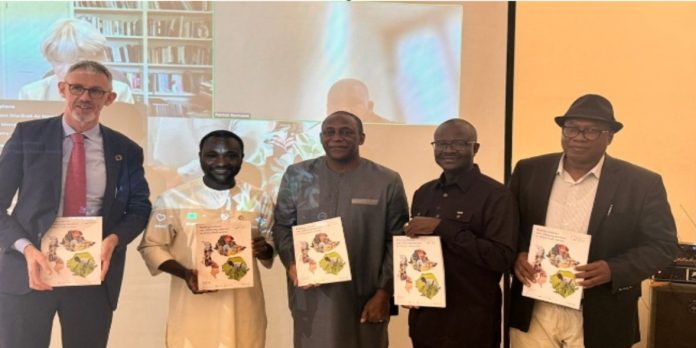AYV News, July 14, 2025
Sierra Leone has joined the global frontlines in tackling food insecurity and nutrition challenges, following the official launch of the Global Panel on Agriculture and Food Systems for Nutrition (GLOPAN) report in Freetown.
The high-level event brought together government officials, international development partners, and agriculture experts, marking a significant moment in the country’s food systems transformation journey.
The GLOPAN report, titled “Strengthening Resilience and Enhancing Nutrition in Food Systems,” outlines Africa’s urgent need to build robust and inclusive food systems that can withstand shocks, from climate change to economic disruptions. Its launch in Sierra Leone comes at a critical time as the country advances its flagship Feed Salone Program and doubles down on nutrition and agricultural reforms.
Delivering his address, Minister of Agriculture, Dr. Henry Musa Kpaka, welcomed the report’s recommendations, noting that Sierra Leone is already on track with several of the proposals.
“We are happy about the coordination recommendation, and we are far advanced on that,” he said. “We’ve seen great progress under the Feed Salone, especially with our school feeding program in collaboration with WFP. Local egg prices have dropped below imported ones, and now, we are planning to roll out an initiative where every school child will receive an egg a day as part of the school feeding program and to improve nutrition.”
Minister Kpaka also highlighted advances in feed mill production for poultry and falling rice prices, both local and imported, citing these as evidence of the government’s efforts to build farmer resilience and boost national nutrition.
The Ambassador of Ireland to Sierra Leone, Ambassador Aidan Fitzpatrick, emphasized the importance of strengthening public-private investment in the agriculture and food sectors, using Sierra Leone’s recent onion production gains as a model.
“Ireland, through Irish Aid and GLOPAN, will continue to support Sierra Leone in transforming its food systems,” the Ambassador stated, thanking the GLOPAN team for producing a much-needed and timely report.
Dr. Kandeh Kolleh Yumkella, Chairman of the Presidential Initiative on Climate Change, Renewable Energy, and Food Security (PI-CREF), hailed the report as “a vital study” that highlights the urgent need for structured transformation. He pointed out the critical role of energy in driving agricultural development, saying that long-term resilience depends on well-functioning systems and strong institutions. He stressed the need for reliable and affordable power to advance agriculture and promote food systems and nutrition.
“We need more Sierra Leoneans doing ten times what PEECE and Sons have done in onion production,” Yumkella said. “We’re confident that under the leadership of President Bio, we can set the foundation for a real transformation.”
Dr. Yumkella also outlined PI-CREF’s commitment to enhancing the rice value chain with support from BADEA and called for broader access to financing that promotes food and nutrition resilience.
Professor Sandy Thomas, Director of GLOPAN, praised the country’s commitment to change and reaffirmed the panel’s support for Sierra Leone.
“Agriculture and food systems are the engine to drive broader development. The timing of this report could not be better,” she said, thanking the Government of Ireland and Sierra Leonean partners for advancing GLOPAN’s work.
Dr. Patrick Kormawa, Director of Agriculture and Food Security at PI-CREF, and the study’s lead expert, presented the report’s core messages. He noted that over 3 billion people globally; and more than 1 billion in Africa, lack access to healthy, sustainable diets.
“Progress has stalled globally,” he said. “This report is an urgent appeal for action.” Dr. Kormawa emphasized key recommendations for Sierra Leone, including: Strengthening multi-level governance of food systems, closing the nutrition resilience gap, scaling up Climate-Smart Agriculture, boosting ethical private sector investment and expanding agro-food industrialisation
He also highlighted the lessons learnt from the Feed Salone agenda by other countries, such as the importance of high-level government commitment and a whole-of-government approach. Kormawa concluded by encouraging stakeholders and the public to download the full GLOPAN report from the official website and engage with its findings.
In a forward-looking move, Fuad Yusuf Bangura, Director of Climate Change at PI-CREF, introduced a new initiative: the Community of Practice (COP).
“The COP will address fragmented knowledge sharing, low stakeholder engagement, and policy misalignment,” he stated. “It will instead foster collaborative learning, joint problem-solving, and stronger partnerships across the food and agriculture sectors.” Bangura stated. He emphasised that the focus areas will include climate resilience in agriculture, knowledge exchange, and alignment with national priorities. Benefits of the COP include: Enhanced food system resilience to climate change, capacity building and innovation, expanded networks and cross-sector partnerships
He concluded with a compelling call to action, encouraging all stakeholders to join the initiative and share their experiences to guide national transformation.
Participants at the event contributed suggestions to ensure the COP is rooted in farmer realities, with calls to reflect its design and implementation at grassroots levels.
The launch of the GLOPAN report and the COP initiative signal a reinvigorated, unified effort to build resilience, strengthen nutrition, and secure Sierra Leone’s food future. Stakeholders agree, the moment for transformation is now, and the foundations being laid today may define Africa’s food security landscape for generations to come.

